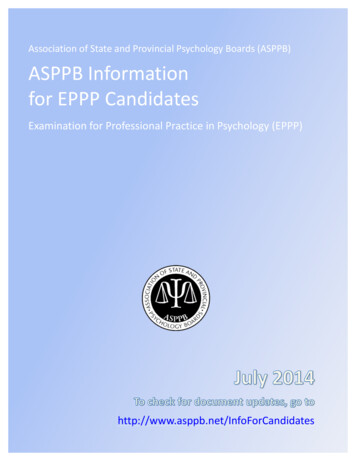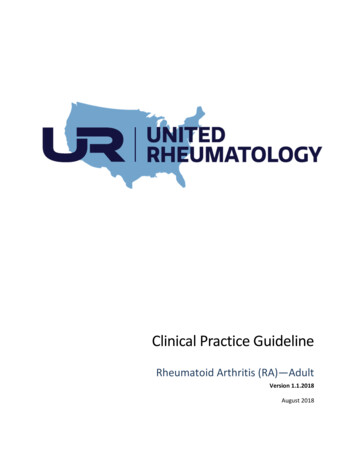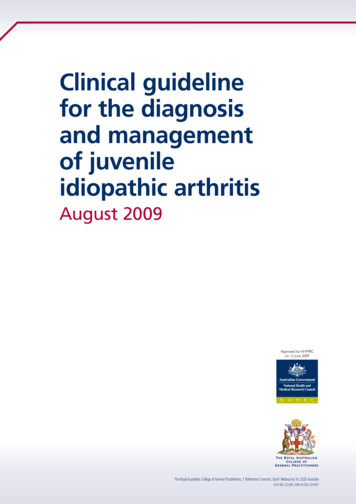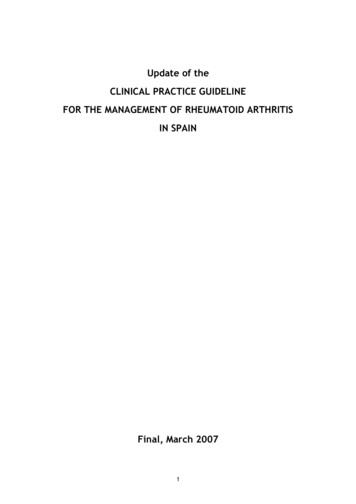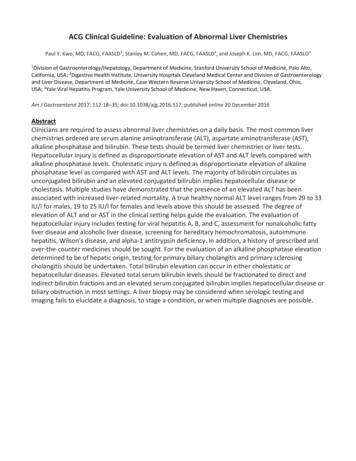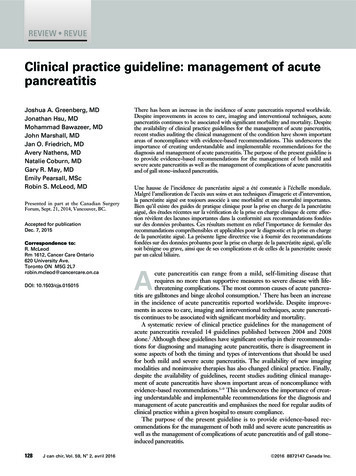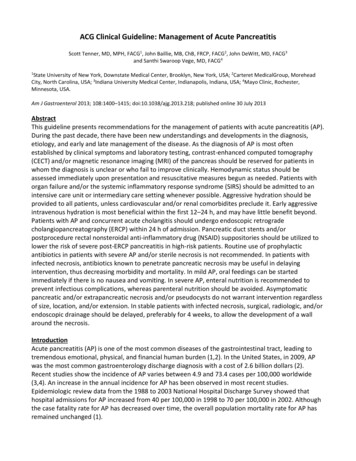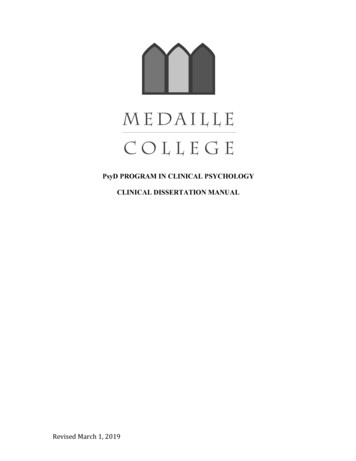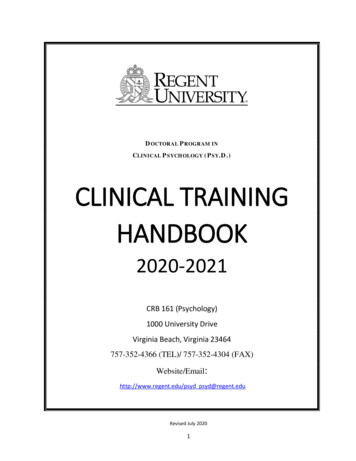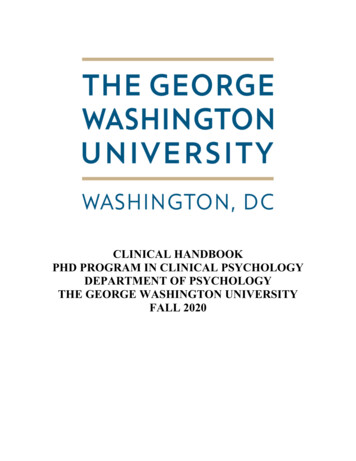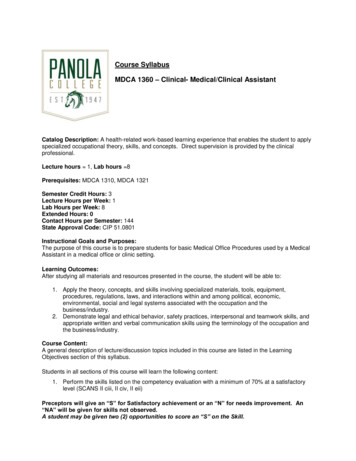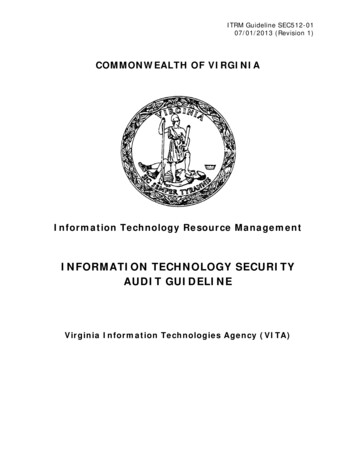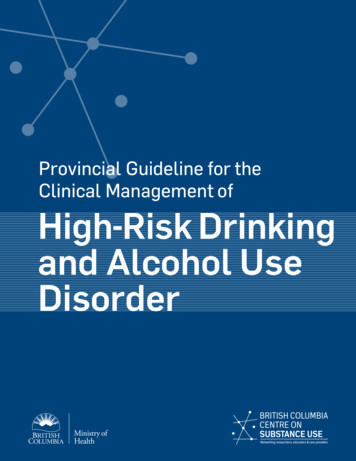
Transcription
Provincial Guideline for theClinical Management ofHigh-Risk Drinkingand Alcohol UseDisorder
Provincial Guideline for the Clinical Management of High-Risk Drinking and Alcohol Use DisorderBritish Columbia Centre on Substance Use (BCCSU), B.C. Ministry of Health and B.C. Ministry of Mental Health andAddictions. Provincial Guideline for the Clinical Management of High-Risk Drinking and Alcohol Use Disorder. 2019.Vancouver, B.C.: BCCSU. Available at: r: British Columbia Centre on Substance Use (BCCSU)Publisher: British Columbia Centre on Substance Use (BCCSU)Document Purpose: Clinical guidancePublication Date: December 2019Target Audience: Physicians, nurses and nurse practitioners, pharmacists, allied health care professionals, and all otherclinical and non-clinical personnel with and without specialized training in addiction medicine, who are involved in thecare and management of individuals, families, and communities affected by alcohol use.Contact:British Columbia Centre on Substance Use400-1045 Howe Street, Vancouver, BC V6Z 2A9inquiries@bccsu.ubc.caLand AcknowledgementThe British Columbia Centre on Substance Use would like to respectfully acknowledge that the land on which we workis the unceded territory of the Coast Salish Peoples, including the territories of the xwmeθkwey’em (Musqueam),Skwxwú7mesh (Squamish), and sel’ílweta (Tsleil-Waututh) Nations.
About the BC Centre on Substance UseThe BC Centre on Substance Use (BCCSU) is a provincially networked organization with a mandate to develop,help implement, and evaluate evidence-based approaches to substance use and addiction. The BCCSU seeks toimprove the integration of best practices and care across the continuum of substance use through the collaborativedevelopment of evidence-based policies, guidelines, and standards. With the support of the Province of BC, theBCCSU aims to transform substance use policies and care by translating research into education and care guidance,thereby serving all British Columbians.The BCCSU seeks to achieve these goals through integrated activities of its three core functions: research andevaluation, education and training, and clinical care guidance.Research and Evaluation — Leading an innovative multidisciplinary program of research, monitoring, evaluationand quality improvement activities to guide health system improvements in the area of substance use.Education and Training — Strengthening addiction medicine education activities across disciplines, academicinstitutions, and health authorities, and training the next generation of interdisciplinary leaders in addictionmedicine.Clinical Care Guidance — Developing and helping implement evidence-based clinical practice guidelines,treatment pathways, and other practice support documents.About the Canadian Research Initiative in Substance MisuseThe Canadian Research Initiative in Substance Misuse (CRISM) is a national research consortium uniquelyfocused on translational and implementation research targeting substance use and related harms, funded by theCanadian Institutes of Health Research (CIHR). The CRISM network comprises four regional Research Nodes:British Columbia, the Prairie Provinces, Ontario, and Quebec/Maritimes. The British Columbia CRISM Node isan expert network with over 50 members spanning the province, including knowledge users, service providers,community leaders, and research scientists. All members are firmly committed to translating the best scientificevidence into practice and policy change, promoting evidence-based approaches to addiction, and training thenext generation of leaders through our comprehensive education programs.1
Authors and ContributorsEmily Wagner, MSc, Senior Medical Writer, British Columbia Centre on Substance UseMaryam Babaei, MSc, Medical Writer, British Columbia Centre on Substance UseProvincial Alcohol Use Disorder Treatment Guideline Committee *Keith Ahamad (committee co-chair), MD, CCFP (AM), CISAM, Dip. ABAM ; Medical Director, Regional AddictionProgram, Vancouver Coastal Health; Clinical Assistant Professor, University of British Columbia; ClinicianScientist, BC Centre on Substance UseNeal Berger, PhD ; Executive Director, Cedars at Cobble Hill (ret.)Rupinder Brar, MD, CCFP (AM), CSIAM ; Clinical Assistant Professor, Department of Family Practice, UBC ; InterimLead, St. Paul’s Hospital Addiction Medicine Consult Service; Physician, PHS Community Services SocietyJennifer Cottell, Member, BCCSU Family Members and Caregivers Representatives CommitteeNicole Cowan, RN, BSN ; Clinical Educator, Vancouver Coastal HealthStephan Ferreira, MD, FASAM, FCFP ; Physician, Northern HealthLyn Firth, Member, BCCSU Network of Family Members and CaregiversRobert Fox, MD, CCFP, CISAM ; Staff Physician, Seabird Island Health Centre; Consulting Physician, RiverstoneOutpatient Detox Program, Fraser Health Authority; Consulting Physician, A:yelexw Recovery HomeBrittany Graham, MPH ; Program Coordinator, Eastside Illicit Drinkers Group for Education (EIDGE); CommunityDeveloper, Vancouver Area Network of Drug Users (VANDU)Jeff Harries, MD, MBA; Physician Lead, South Okanagan AUD InitiativeRamm Hering, MD, MSc, CCFP, Dip. PH, Dip. ABAM, CCSAM, FASAM ; Medical Director, Addiction Medicine,Island Health; Physician Lead, Victoria Rapid Access Addiction Clinic (RAAC), Island Health; Physician Lead,Addiction Medicine Consult Service (AMCS), Royal Jubilee and Victoria General Hospitals, Island Health;Victoria Site Director, BC Centre on Substance Use Addiction Medicine Fellowship; Clinical Instructor, Facultyof Medicine, University of British ColumbiaRonald Joe, MSc, MBChB, DABAM ; Medical Director, Substance Use, Vancouver Community, Vancouver CoastalHealthCheyenne Johnson (steering committee chair), RN, MPH, CCRP ; Interim Executive Director, British ColumbiaCentre on Substance UseJan Klimas, PhD, MSc; Senior Postdoctoral Fellow, BC Centre on Substance UseRon Kuhlke, Advocate, Single Room Occupancy (SRO) Collective; Steering Committee Member, EIDGE ; BoardMember, VANDUMona Kwong, BSc (Pharm), MSc, PharmD; Pharmacy Advisor, BC Centre on Substance Use; Clinical Pharmacist andManager, Pharmasave Howe Street; Clinical Consultant Pharmacist, Infinity Medical Specialists Clinic; ClinicalInstructor, Faculty of Pharmaceutical Sciences, University of British ColumbiaPrabh Lail, MD, FRCPC, ISAM(C); Physician, St Paul’s Hospital; Fellow, Canadian Addiction Medicine ResearchFellowship; Medical Director, Addiction Recovery and Community Health, Calgary, Alberta Health ServicesLeslie Lappalainen, MD, CCFP, Dip. ABAM ; Medical Lead for Addiction Medicine, Interior HealthSandra Lee, MD, CCFP, FCFP ; Medical Consultant, Guidelines and Protocols Advisory Committee; Family Physician;Assistant Clinical Professor, Department of Family Practice, University of British ColumbiaMary Marlow, BHSc, RPN ; Manager, Mental Health and Substance Use Services, Vancouver Community, VancouverCoastal Health; Clinical Instructor, Vancouver Community College2
Nick Mathew, MD, MSc, ABPN, FRCPC, ABPM ; Addiction Division Lead, Surrey Memorial Hospital; ClinicalAssistant Professor, University of British ColumbiaMark McLean, MD, MSc, FRCPC, CISAM, Dip. ABAM ; Medical Lead, St Paul’s Hospital Rapid Access AddictionClinic; Physician, St Paul’s Hospital Addiction Medicine Consult Team; Medical Lead, Vancouver Detox, VancouverCoastal Health; Clinical Assistant Professor, University of British ColumbiaDoug McTaggart, BComm, MD ; Medical Consultant, Guidelines and Protocols Advisory Committee; Family PhysicianJill Murray, PhD, Research Officer; Guidelines and Protocols Advisory Committee; Ministry of HealthSeonaid Nolan, MD, FRCPC, Dip. ABAM ; Assistant Professor, Department of Medicine, University of BritishColumbia; Head, Interdepartmental Division of Addiction Medicine, Providence Health Care; Physician ProgramDirector, Interdisciplinary Substance Use Program, Providence Health Care; Research Scientist, BC Centre onSubstance Use; Health Professional Investigator, Michael Smith Foundation for Health Research HealthWalton Pang, BSc (Pharm), MSc (Pharm), MHA; Director, Optimal Use, Drug Intelligence, Optimization, Outcomes,and Strategy, Pharmaceutical Services Division, Ministry of HealthDaniel Paré, MD, CCFP (AM), CCSAM, Dip. ABAM ; Medical Manager, Downtown Eastside (DTES) Primary Care;Medical Coordinator, DTES Connections Clinic, Vancouver Coastal Health; Clinical Instructor, Department ofFamily Practice, University of British ColumbiaBernadette (Bernie) Pauly, RN, PhD; Professor, School of Nursing, University of Victoria; Scientist, Canadian Institutefor Substance Use Research; Community Engaged Scholar, University of Victoria; Island Health Scholar in ResidenceBrenda Plant, BA, CSAC, CSAPA, CACCF, ICCAC, ICADC ; Executive Director, Turning Point Recovery Society;Member, BC Council for Recovery ExcellenceNancy Poole, PhD; Director, Centre of Excellence for Women’s HealthNitasha Puri, MD, CCFP (AM), Dip. ABAM ; Physician Consultant, Vancouver Coastal Health and Fraser HealthAuthority; Clinical Assistant Professor, University of British Columbia; Clinician Researcher, British ColumbiaCentre on Substance UseKaye Robinson, MSW, RSW; Social Worker, Rapid Access Addiction Clinic, Providence Health CareDiane Rothon, BSc, MD, CM, MPH, CFPC (AM); Medical Director, Youth Justice and Forensic Services, Ministry ofChildren and Family Development; Medical Director, Alavida Addiction ServicesNader Sharifi, BSc, MD, CCFP (AM), Dip. ABAM, CCHP-P ; Medical Director, Correctional Health Services, BC MentalHealth and Substance Use ServicesHeather Smith, MD, CCFP ; Physician, Central Interior Native Health; Physician, Northern HealthChristy Sutherland, MD, CCFP (AM), Dip. ABAM ; Medical Director, PHS Community Services Society; PhysicianEducation Lead, British Columbia Centre on Substance Use; Clinical Assistant Professor, UBC Department ofFamily MedicineGerald Thomas, PhD ; Collaborating Scientist, Canadian Institute for Substance Use Research, University of Victoria;Adjunct Professor, Department of Psychology, University of British ColumbiaCornelia (Nel) Wieman, MSc, MD, FRCPC ; Senior Medical Officer — Mental Health & Wellness, First Nations HealthAuthorityEvan Wood (co-chair), MD, PhD, ABIM, FRCPC, Dip. ABAM, FASAM; Professor of Medicine, University of BritishColumbia; Canada Research Chair in Inner City Medicine; Executive Director, British Columbia Centre onSubstance Use; Principal Investigator, British Columbia Node of the Canadian Research Initiative in SubstanceMisuse* Note: Committee members participated in guideline development activitiesin their individual capacity and not as institutional representatives.3
External Review Panel*Heather Fulton, PhD, RPsych; Psychologist, Burnaby Centre for Mental Health and Addiction; Psychologist, NorthShore Stress and Anxiety Clinic; Adjunct Faculty Member, Department of Psychology, University of British ColumbiaJames Garbutt, MD ; Professor of Psychiatry, University of North Carolina, School of MedicineHenry R. Kranzler, MD, Benjamin Rush Professor of Psychiatry; Director, Center for Studies of Addiction, Universityof Pennsylvania, Perelman School of MedicineBernard Le Foll, MD, PhD, MCFP ; Laureate of the French Academy of Medicine; Medical Head, ConcurrentOutpatient Medical & Psychosocial Addiction Support Service (COMPASS), Acute Care Program, Centre forAddictions and Mental Health (CAMH); Head, Alcohol Research and Treatment Clinic, COMPASS, Acute CareProgram, CAMH ; Head, Translational Addiction Research Laboratory, Campbell Family Mental Health ResearchInstitute, CAMH ; Professor, Departments of Family and Community Medicine, Pharmacology, Psychiatry andInstitute of Medical Sciences; University of TorontoZak Matieschyn, NP(F), MN ; Director, Addiction Nurse Practitioner Fellowship, British Columbia Centre onSubstance Use; Clinical Consultant, CRISM Nursing Led Model of Care ProjectMichael Soyka, MD, Prof.; Chefarzt und Medizinischer Direktor, Medical Park ChiemseeblickZachary Walsh, PhD, RPsych; Associate Professor, Psychology, University of British Columbia* Note: External reviewers contributed to guideline review activities in their individual capacity and not as institutional representatives.Community ReviewersEastside Illicit Drinkers Group for Education (EIDGE) and the Vancouver Area Network of Drug Users (VANDU)Family Members and Caregiver Representatives Committee, British Columbia Centre on Substance UseHealth Systems, Education and Clinical Tools Working Group, Recovery Initiatives, British Columbia Centre onSubstance UseHealth System Reviewers and Partners4
AcknowledgementsThe guideline committee gratefully acknowledges Lindsay Farrell, PhD, Director of Strategic Initiatives andSpecial Projects and holder of the Indigenous Substance Use Leadership Professorship at the BCCSU, forauthorship and review of the Indigenous Cultural Safety and Working with Indigenous Peoples sections of thisguideline. The committee also wishes to thank Mary-Doug Wright, BSc, MLS, for her expertise in developingthe systematic literature search strategy and conducting related research activities. The committee gratefullyacknowledges the internal and external reviewers of the Guideline Appendices: Paxton Bach, Rupinder Brar,Nicole Cowan, Marlon Danilewitz, Sukhpreet Klaire, Mona Kwong, Mark Mclean, Seonaid Nolan, ChristySutherland, Samantha Young, and Susan Wright. Finally, the committee is grateful to the following BCCSU staffmembers for their support and contributions to this work: Maya Bird, Jessica Bright, Trish Emerson, Yuko Endo,Christine Fei, Amanda Geisler, Nirupa Goel, Kevin Hollett, Alina Hoosein, Chiarine Hsu, Athena Huynh, KatieMai, Warren O’Briain, Samantha Robinson, and Josey Ross.This work was undertaken, in part, thanks to funding provided to the BCCSU from the Province of BritishColumbia. Additional funding support was provided by the Canadian Institutes of Health Research (CIHR)through the Canadian Research Initiative in Substance Misuse (SMN –139148). Dr. Keith Ahamad (CommitteeCo-Chair) is supported by a CIHR Embedded Clinician Researcher Salary Award – Western Canada (TI2-147863).Dr. Evan Wood (Committee Co-Chair) is supported by the Canada Research Chairs program through a Tier 1Canada Research Chair in Inner City Medicine.5
Disclaimer for Health Care ProvidersThe recommendations in this guideline represent the view of the provincial guideline committee, arrived at aftercareful consideration of the available scientific evidence and following external expert peer review. The applicationof the recommendations in this guideline does not override the responsibility of health care professionals tomake decisions that are appropriate to the needs, preferences, and values of an individual patient, in consultationwith that patient and their family members or guardian(s), and, when appropriate, external experts (e.g., specialtyconsultation). When exercising clinical judgment in the treatment of high-risk drinking and alcohol usedisorder, BC health care professionals are expected to take this guideline fully into account while upholding theirduty to adhere to the fundamental principles and values of the Canadian Medical Association Code of Ethics,especially compassion, beneficence, non-maleficence, respect for persons, justice and accountability, as well asthe required standards for good clinical practice as set by the College of Physicians and Surgeons of BritishColumbia and any other relevant provincial regulatory body. Nothing in this guideline should be interpreted ina way that would be inconsistent with compliance with those duties.Legal DisclaimerWhile the individuals and groups involved in the production of this document have made every effort to ensurethe accuracy of the information contained in this treatment guideline, please note that the information is provided“as is”. The Ministry of Health (MoH), the Ministry of Mental Health and Addictions (MMHA), and the BCCSUmake no representation or warranty of any kind, either expressed or implied, as to the accuracy of the information or the fitness of the information for any particular use. To the fullest extent possible under applicable law,the MoH, MMHA, and the BCCSU disclaims and will not be bound by any express, implied or statutory representation or warranty (including, without limitation, representations or warranties of title or non-infringement).The Guideline is intended to give an understanding of a clinical problem, and outline one or more preferredapproaches to the investigation and management of the problem. The Guideline is not intended as a substitutefor the advice or professional judgment of a health care professional, nor is it intended to be the only approachto the management of a clinical problem. We cannot respond to patients or patient advocates requesting adviceon issues related to medical conditions. If you need medical advice, please contact a health care professional.6
Table of ContentsExecutive Summary. . . . . . . . . . . . . . . . . . . . . . . . . . . . . . . . . . . . . . . . . . . . . . . . . . . . . . . . . . . . . . . . . . . . . . . . . . . . . . . . . . . . . . . . . . . . . . . . . . . . . . . . . . . . . . . . . . . 121. Introduction to the Guideline. . . . . . . . . . . . . . . . . . . . . . . . . . . . . . . . . . . . . . . . . . . . . . . . . . . . . . . . . . . . . . . . . . . . . . . . . . . . . . . . . . . . . . . . . . . . . . 141.1 Guideline Structure. . . . . . . . . . . . . . . . . . . . . . . . . . . . . . . . . . . . . . . . . . . . . . . . . . . . . . . . . . . . . . . . . . . . . . . . . . . . . . . . . . . . . . . . . . . . . . . . . . . . . . . . . 141.2 Scope of the Guideline. . . . . . . . . . . . . . . . . . . . . . . . . . . . . . . . . . . . . . . . . . . . . . . . . . . . . . . . . . . . . . . . . . . . . . . . . . . . . . . . . . . . . . . . . . . . . . . . . . . . 151.2.1 Objective and Purpose. . . . . . . . . . . . . . . . . . . . . . . . . . . . . . . . . . . . . . . . . . . . . . . . . . . . . . . . . . . . . . . . . . . . . . . . . . . . . . . . . . . . . . . . . . . . . 161.2.2 Intended Audience. . . . . . . . . . . . . . . . . . . . . . . . . . . . . . . . . . . . . . . . . . . . . . . . . . . . . . . . . . . . . . . . . . . . . . . . . . . . . . . . . . . . . . . . . . . . . . . . . . . 161.2.3 Care Settings. . . . . . . . . . . . . . . . . . . . . . . . . . . . . . . . . . . . . . . . . . . . . . . . . . . . . . . . . . . . . . . . . . . . . . . . . . . . . . . . . . . . . . . . . . . . . . . . . . . . . . . . . . . . . 161.2.4 Patient Populations. . . . . . . . . . . . . . . . . . . . . . . . . . . . . . . . . . . . . . . . . . . . . . . . . . . . . . . . . . . . . . . . . . . . . . . . . . . . . . . . . . . . . . . . . . . . . . . . . . 161.3 Methods. . . . . . . . . . . . . . . . . . . . . . . . . . . . . . . . . . . . . . . . . . . . . . . . . . . . . . . . . . . . . . . . . . . . . . . . . . . . . . . . . . . . . . . . . . . . . . . . . . . . . . . . . . . . . . . . . . . . . . . . . . . . . 171.3.1 Funding. . . . . . . . . . . . . . . . . . . . . . . . . . . . . . . . . . . . . . . . . . . . . . . . . . . . . . . . . . . . . . . . . . . . . . . . . . . . . . . . . . . . . . . . . . . . . . . . . . . . . . . . . . . . . . . . . . . . . . 171.3.2 Committee Membership. . . . . . . . . . . . . . . . . . . . . . . . . . . . . . . . . . . . . . . . . . . . . . . . . . . . . . . . . . . . . . . . . . . . . . . . . . . . . . . . . . . . . . . . . . 171.3.3 Conflict of Interest Policy. . . . . . . . . . . . . . . . . . . . . . . . . . . . . . . . . . . . . . . . . . . . . . . . . . . . . . . . . . . . . . . . . . . . . . . . . . . . . . . . . . . . . . . . 171.3.4 Guideline Development Process. . . . . . . . . . . . . . . . . . . . . . . . . . . . . . . . . . . . .
Provincial Guideline for the Clinical Management of High-Risk Drinking and Alcohol Use Disorder British Columbia Centre on Substance Use (BCCSU), B.C. Ministry of Health and B.C. Ministry of
